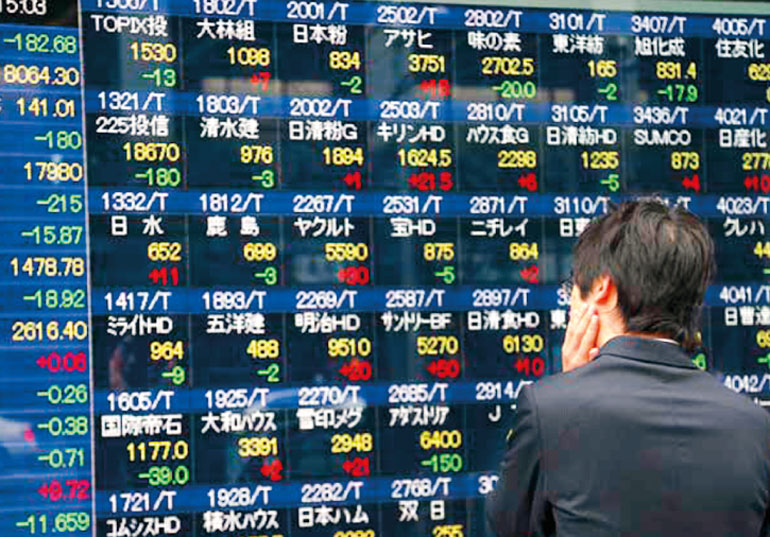Sunday Feb 22, 2026
Sunday Feb 22, 2026
Tuesday, 12 April 2016 00:03 - - {{hitsCtrl.values.hits}}
TOKYO (Reuters): Asian stocks erased early losses and edged up on Monday as Chinese inflation data fanned optimism Beijing will continue with loose monetary policies, while Japanese shares slid as the dollar notched a fresh 17-month low against the yen.
Financial spreadbetters expected subdued openings for European bourses, with Britain’s FTSE 100 seen down around 0.2%, Germany’s DAX expected to open down as much as 0.3%, and France’s CAC 40 seen opening 0.4% lower.

MSCI’s broadest index of Asia-Pacific shares outside Japan added about 0.2%, after Wall Street ended with modest gains on Friday even as the S&P 500 still suffered its biggest weekly decline in two months.
Japan’s Nikkei stock index was off its session lows but still ended down 0.4%. In addition to a stronger currency, data released early on Monday showed Japan’s core machinery orders fell 9.2% in February from the previous month, in a sign that business investment remains subdued.
“While February’s machinery orders fell less than anticipated, Japan markets remain weighed down by a strengthening yen and uncertainty surrounding when, or if, the Bank of Japan will intervene,” said Andrew Meredith, co-managing director at Tyton Capital Advisors.
Chinese data released earlier on Monday showed that country’s consumer price inflation was less than expected in March, while wholesale prices declined less than anticipated, in a sign that deflationary pressure in the industrial sector may be easing.
While the figures pointed to stabilising prices, they also underscored that the central bank’s prolonged easing campaign begun in late 2014 has yet to result in substantial price increases and raised hopes of more stimulus steps.
“The CPI data is lower than expected, so investors now expect further monetary easing to come,” said Zhu Bin, analyst at Southwest Securities Co.
Chinese shares were higher, with the blue-chip CSI300 index up 1.7%, while the Shanghai Composite Index added 1.8%.
The greenback’s recent slide against the yen prompted a chorus of warnings from officials in Tokyo and put investors on alert for direct yen-selling intervention, though many believed Japan would stay its intervention hand.
Japan’s top government spokesman, Chief Cabinet Secretary Yoshihide Suga, said on Monday that recent currency moves were one-sided and speculative and that the government would take steps as needed.
The dollar wallowed close to lows notched last week, as investors mulled the outlook for U.S. monetary policy, with the Federal Reserve seen as being more cautious on hiking interest rates than some investors had believed.
The dollar index, which tracks the U.S. unit against a basket of six major currencies, fell 0.1% to 94.136 , within sight of last week’s low of 94.015, which was its lowest since October.
The euro was up about 0.1% at $1.1407, not far from last week’s high of $1.1454, its highest since October.
The dollar slipped about 0.2% to 107.89 yen after earlier nudging down to 107.63, which was its weakest since October 2014.
Oil prices edged down as investors took profits after crude soared more than 6% on Friday. They also marked gains of about 8% for the week, as drawdowns in U.S. crude stockpiles fed hopes that the end was in sight for the global supply glut that has plagued the industry for nearly two years.
U.S. crude futures edged down 0.3% to $39.60 a barrel after jumping 6.6% on Friday, while Brent crude was down about 0.2% at $41.85, after settling up 6.4%.
The weaker dollar helped lift spot gold to its highest in nearly three weeks. Gold rose to $1,252.26 an ounce, its highest since 22 March. It was last up about 0.7% at $1,249.11.
Oil prices rise in Asia as Doha meeting, US report loom
AFP: Crude prices edged down in Asia Monday following last week’s gains that were fuelled by data showing a drop in US production, while traders look ahead to an upcoming meeting of oil majors they hope will lead to output limits. |